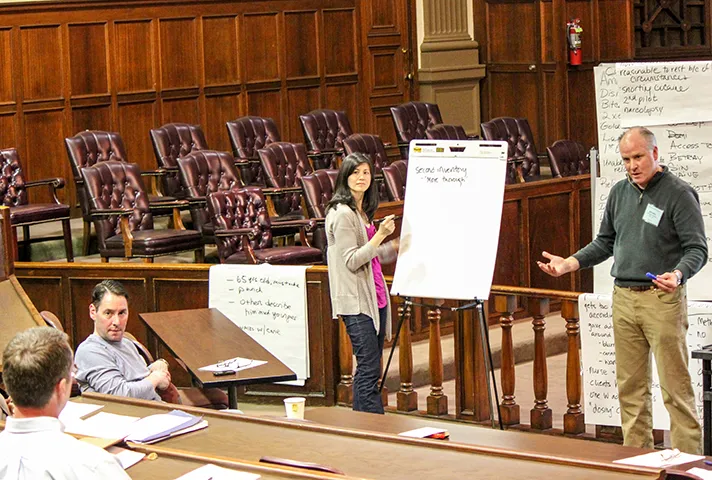
Workshop participants practice breaking down the facts of a case during a trial skills workshop held at the California Western School of Law in San Diego.
Defense attorney Renorda Pryor was in the middle of a difficult case. Her client was facing a five-year prison sentence for a crime he committed years earlier, but since that time, had turned his life around.
She strongly felt prison was not the answer for the 28-year-old man, who was facing charges for conspiracy related to drug trafficking activities five years earlier. Since then, he had started his own trucking business and gotten married. He and his wife had two children, with a third on the way. The sentencing hearing was approaching and Pryor had just one chance to convince the judge to give her client probation instead of prison.
Pryor, a private attorney who is regularly appointed by the court to defend cases under the Criminal Justice Act (CJA) in the Middle District of North Carolina, decided to reach out for help. She dialed the number for the Judiciary’s Defender Services Office (DSO) Training Division, where experienced trial attorneys are on call weekdays from 9 a.m. to 5 p.m.
The attorney-advisor who answered the call suggested that Pryor present the judge with a video depicting her client’s changed life and extensive rehabilitation, and stress the cost savings to the public of avoiding incarceration, which is roughly eight times the cost of supervising an individual on probation.
Pryor took the advice and was able to present a fuller picture of her client’s life and circumstances. She convinced the judge that a sentence of five years of probation met the needs of justice and public safety.
“It felt as if I had the resources of a large law firm at my disposal,” she said.
Fielding calls like Pryor’s are all in a day’s work for the DSO Training Division, whose staff is dedicated to helping lawyers in the field as they defend individuals unable to afford a private lawyer and critical defense services.
The hotline is staffed by criminal defense practitioners who are experienced in trial and appellate litigation. They answer questions about the application of federal rules and sentencing guidelines, help formulate trial strategies, and connect callers with a network of lawyers with expertise in particular areas. The attorney-advisers rotate phone duties daily, fielding as many as five calls a day.
Many of the lawyers representing clients are CJA panel attorneys -- private practitioners appointed by courts at an hourly rate to defend those who cannot afford to pay for a lawyer. The right to be represented by an attorney in a criminal case is guaranteed by the Sixth Amendment to the Constitution. The Criminal Justice Act provides for the federal funding of attorneys, experts, and services for indigent defendants.
“Panel attorneys do not work on federal criminal cases on a daily basis,” said Lori Green, who heads the Training Division. “Being able to call an experienced attorney to verify current rules and trial strategies ensures that the client receives the best defense.”
In addition to operating the national support hotline, the Training Division conducts in-person and web-based workshops across the country for thousands of participants and runs a website that offers training materials and litigation support information.
“Defense lawyers often lack courtroom experience, with most cases never reaching trial and ending in plea deals,” Green said. “Our workshops teach lawyers practical skills that can be applied in the courtroom and provide them with the opportunity to share ideas and brainstorm case strategies with one another.”
Facilitators cover topics including the fundamentals of a federal criminal defense, sentencing advocacy, electronic case management, and implicit bias. Hands-on sessions allow participants to practice trial skills in a simulated courtroom setting and to work through the challenging aspects of active cases in small groups.
“Events are a great opportunity to build relationships with fellow lawyers that just isn’t present at a courthouse where everyone is engrossed in their work,” said Darnell Crosland, a CJA panel attorney in the District of Connecticut. “I rarely find myself reaching out to a stranger when I’m stuck on a case. Instead, I’m reaching out to people I call colleagues and friends.”
Subscribe to News Updates
Subscribe to be notified when the news section is updated.
